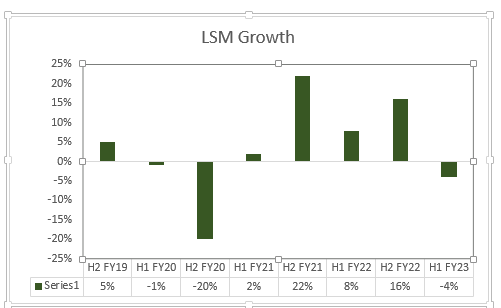INP-WealthPk
Ayesha Mudassar
The country’s development is strongly linked with the growth of the industrial sector. However, a combination of policy tightening, import controls, steep currency devaluation, and lower global demand have affected the performance of the sector, says Engineering Development Board (EDB) Chief Executive Officer Raza Abbas Shah. The Large-Scale Manufacturing (LSM) index, a key indicator for industrial activity, decreased by 3.7% in the first half of the current fiscal year (1HFY23) compared to a growth of 7.7% in 1HFY22, as per the World Bank’s recent report.
The contraction was broad-based, with 18 out of the 22 sectors (accounting for 89.6% of the index) recording lower production. Only wearing apparel, leather products, furniture, and other manufacturing sectors saw an increase in production. Similarly, domestic cement dispatches, an important indicator of construction sector activity, decreased by 20.7% during 1HFY23.

Source: Pakistan Bureau of Statistics
The two sectors, which have been hit the hardest by the ongoing depressed economic conditions are pharmaceuticals and automobiles. Talking to WealthPK, Pharmaceutical Manufacturers Association Chairman Syed Farooq Bukhari said the drying-up of international reserves and eroding rupee value had significantly reduced the country’s ability to import essential medicines or active pharmaceutical ingredients used in domestic production. “Resultantly, dozens of local companies have written letters to the Drug Regulatory Authority of Pakistan (DRAP) signalling the suspension of production if such a situation continues.”
Engineer Asim Ayaz, secretary of the Auto Industry Development Committee (AIDC), said that conditions of the auto market have been largely exacerbated by the import restrictions, and massive increase in vehicle prices. The LSM sector contributes heavily to revenue collection and job creation. However, constant decline in growth will largely impact the business sentiment and employment levels.
Credit : Independent News Pakistan-WealthPk




